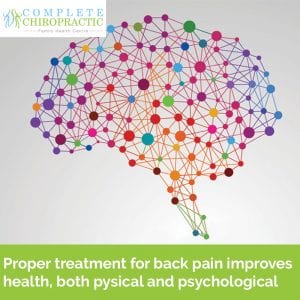Back pain is by far one of the most common conditions we treat here at the clinic. In fact, it’s so common that many people really do believe that low back pain is “just part of life”. For some, this can lead to questioning if their pain really is that bad and, if its “all in their head”. This week, let’s look at the psychological aspects of back pain, and how you can support your mental wellbeing when living with pain.
Back pain, it’s common… perhaps too common…
Back pain is very common – around six in 10 people will get at least one episode of severe pain at some point during their life, but for most of us, mild back pain which comes and goes is hardly a surprising event. On many occasions, some appropriate self-help measures or correct treatment early on (especially when injuries are concerned) sees pain resolve itself within a few weeks. Sometimes, however, pain can linger for weeks.. months, or even years. At this point, it can start to have a real impact on your quality of life. If you take time off work with back pain, you may find it increasingly hard to return as time goes on. You may feel in a low mood because of the pain, and this can make the problem worse. People with ongoing back pain can find themselves in a recurring cycle of pain and feeling low.
Emotions and back pain
How you feel and respond to pain is a complex process which can be influenced by many factors, and can vary between episodes of pain. There’s the physiological process – that means whatever’s happened in your body to cause the pain. And then there’s the psychological process – how your brain reacts to the pain. Your pain is almost certainly very real, but your perception of it (how bad it feels to you) and how much of an impact it has are both strongly influenced by your feelings, attitudes and beliefs – and those beliefs can be strongly influenced by the care you receive.
Those who have an effective way to deal with pain when it occurs, and perhaps most importantly of all, are able to quickly get an explanation as to why they are in pain, are often able to recover faster than those without this clarity. Indeed, many of our patients find that they feel better in themselves (even if their pain has not yet reduced) as soon as they have had their initial consultation and have had the source of their pain explained. Just knowing what the issue is, and how it can be fixed is hugely empowering. But what about those who do not have the benefit of a quick diagnosis or an effective option for treatment?
People often find themselves:
- Believing that any activity which causes pain is harmful to them. This belief is understandable – this hurts, so it must be bad, but back pain can often lead to distress when doing activities such as gentle exercise which are most certainly not harmful!
- Negative actions can reinforce the belief that you’re unwell – for example, staying in bed for a long time can make you feel isolated and more “ill” than before – although severe pain might limit your options.
- Having a low or negative mood, depression, anxiety or stress – very often caused not by the pain itself, but by the impact, it has on your everyday life, work and family.
- Having low expectations of how well the treatment will work – its important that a treatment plan is clear, targeted and aimed at the real issue.
- Relying on passive treatments such as painkillers, hot and cold packs, or the wrong kinds of self-help exercises.
It’s easy to see how these kinds of beliefs can form a vicious cycle!
The psychology of back pain – how we can help
While we are a chiropractic clinic and not a source of psychological therapy, there’s a lot we can do to combat the psychological distress associated with back pain.
Firstly, at Complete Chiropractic we have state of the art diagnostic facilities right here on site – unlike some chiropractors, this allows us to perform your initial consultation and appropriate X-rays all in one appointment and quickly get back to you with an assessment of the root cause of your pain. Many clients do find that simply having the opportunity to speak to an expert in back pain who really understands how they feel, both physically and mentally, is a major help in calming the mind and restoring a sense of control. After all, while your family and friends may be well-meaning and try to offer good advice, back pain is what we do – all day, every day!
Secondly, chiropractic treatment itself is able to offer fast results for many clients. It’s typical for clients to notice an improvement in their pain after only a few sessions, and in some cases right away. This is not to say that treatment will fully resolve your issue immediately – the length of treatment will depend on the severity, nature and complexity of your problem, but even a small reduction of pain early on is enough to help many people to reframe their expectations of treatment. Day to day, even slightly less pain can also be a game changer! Speaking of expectations, why not check out our recent reviews?
Thirdly, putting yourself under chiropractic care, and getting a professional assessment ticks one key box – it can confirm for you that your pain is not “all in your head”, and often this is the first step to recovery. When the source of your pain has been identified, it can be treated – and beginning treatment puts an end to the wondering and worrying. Once treatment is underway we work hard to increase your mobility and ability to live a normal life as quickly as possible. By gradually resolving your back pain issue, you are freed up to return to more and more of your normal life – which in turn can actually help to support the treatment.
Is back pain ruining your life?
If you associate with any of the issues described in this article, please don’t hesitate to give us a call and book an initial consultation. Many of our clients do find their way to the clinic as a last resort, often having struggled with pain for months or even years. Getting a professional opinion from a spinal specialist isn’t just the first step to resolving your physical pain – it might be the turning point for your mental health too!

